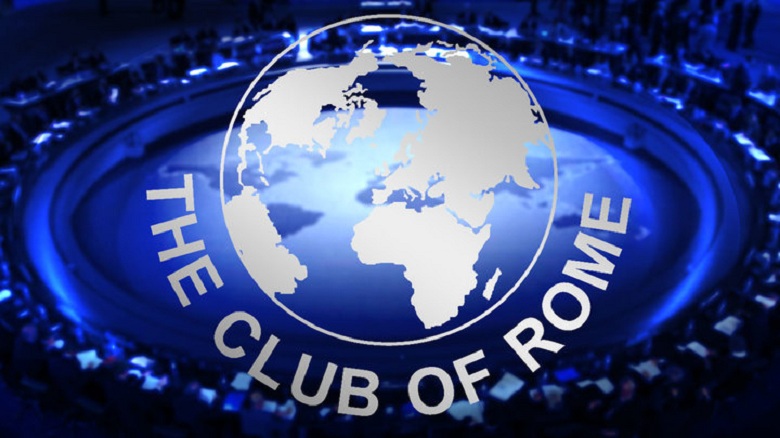
The Club of Rome is an international public organization (think tank) founded by the Italian industrialist Aurelio Peccei (who became its first president) and the OECD Director General for Science, Alexander King, on April 6-7, 1968, uniting representatives of the world political, financial, cultural and scientific elite. The organization has contributed significantly to the study of the future of the biosphere and promoted the idea of harmonizing the relationship between man and nature.
One of the main tasks of the Club of Rome from the beginning was to attract the attention of the world community to global problems through its reports. The Club’s commissioning of the reports determines only the topic and guarantees the financing of scientific research, but in no way affects the course of the work or its results and conclusions; the authors of the reports, including those who are members of the Club, enjoy complete freedom and independence. After receiving a report, the Club reviews and approves it, usually during an annual conference, often in the presence of the general public — members of the public, academia, politicians, the press — and then disseminates the results of the research by publishing the reports and holding discussions in different audiences and countries around the world.
The Club of Rome organizes large-scale research on a wide range of issues, but mostly in the socio-economic field.
Activities of the Club of Rome include a wide range of specific scientific developments, which gave rise to such a new direction of scientific research as global modeling, global problems, general philosophical reasoning about human existence in the modern world, the values of life and the prospects of human development. Works in the field of global modeling, the construction of the first computer models of the world, criticism of negative trends in Western civilization, debunking the technocratic myth of economic growth as the most effective means of solving all problems, searching for ways to humanize man and the world, condemning the arms race, calling on the world community to combine efforts, stop interethnic strife, preserve the environment, improve human welfare and quality of life — all this represents the positive aspects of Rome Club activity.
Theoretical studies of the Club of Rome representatives as well as research methodology are used in various sciences.
Practical recommendations are taken into account when planning the socio-economic development of individual countries, industries, corporations and firms.
Efim Mikhailovich Malitikov in his articles and speeches repeatedly mentioned the activities and reports of the Club of Rome in connection with the development of the global adult education system:
«The conclusion of many years of research by the World Bank is the fact: — In the national wealth of any country, if we compare even the unmeasurable — the United States and the Malagasy Republic (Madagascar), PRODUCTION COMPONENT is the same small amount — a little over 16%. The rest, more than 80%, as already noted, come from human resources. It is important to note that, according to experts of the world community, adult education is not an integral part of the basic education received by the young generation. The fact is that it should be the main continuous activity of the entire adult population, combined with science, production, services, throughout life. The Club of Rome will be discussing this issue in a forward-looking AGENDA.
Only by interspersing and alternating throughout life education, work and, within these processes and periods, free time for our hobbies, family and social activities, will we become effective, long-lived and happy, needed by each other, by previous and future generations and by the country, will we return the planet slipping into the abyss to a sustainable development option».
«It has become obvious that the development of civilization within the framework of existing models and strategies has become unstable. The problem of the very possibility of existence of future generations has arisen. The question «what to do» was first raised by the Club of Rome, then the search for a way out of the crisis was continued at the Stockholm Conference of the UN in 1972, the Brundland Commission in 1987, the UN Conference on Environment and Development in 1992 in Rio de Janeiro and a number of subsequent events, in particular the European Environment Ministers Conference in Lucerne in 1993.The term «sustainable development» appeared as a result. Sustainable development must be based on economic mechanisms that, on the one hand, lead to the efficient use of the planet’s resources and preserve the quality of the environment, and, on the other hand, satisfy the needs of people and improve the quality of life not only for the present generations, but also for future generations.
In 2017 the Club of Rome presented a new report, «Come On! Capitalism, Short-termism, Population and the Destruction of the Planet,» to coincide with its half-century anniversary. It is potentially one of the most important documents of our time. The Club of Rome remains the main platform formulating the agenda of responsible globalism and sustainable development, and a reference point for much of the world’s elite. Although reports on behalf of the Club are published regularly — there have been over forty in all since 1968 — almost all of them are positioned as works addressed to and supported by the Club. «Come On!» is the second report in fifty years to express the Club’s consolidated position.
The anniversary report was written by the Club’s two presidents, Ernst Weizsäcker and Anders Wijkman, with the participation of thirty-four other members. It does not contain a harsh criticism of capitalism, a rejection of financial speculation, a rejection of materialism and reductionism, a call for an alternative economy, a «new Enlightenment,» a holistic worldview, a planetary civilization — this is the agenda proposed by the Club of Rome
